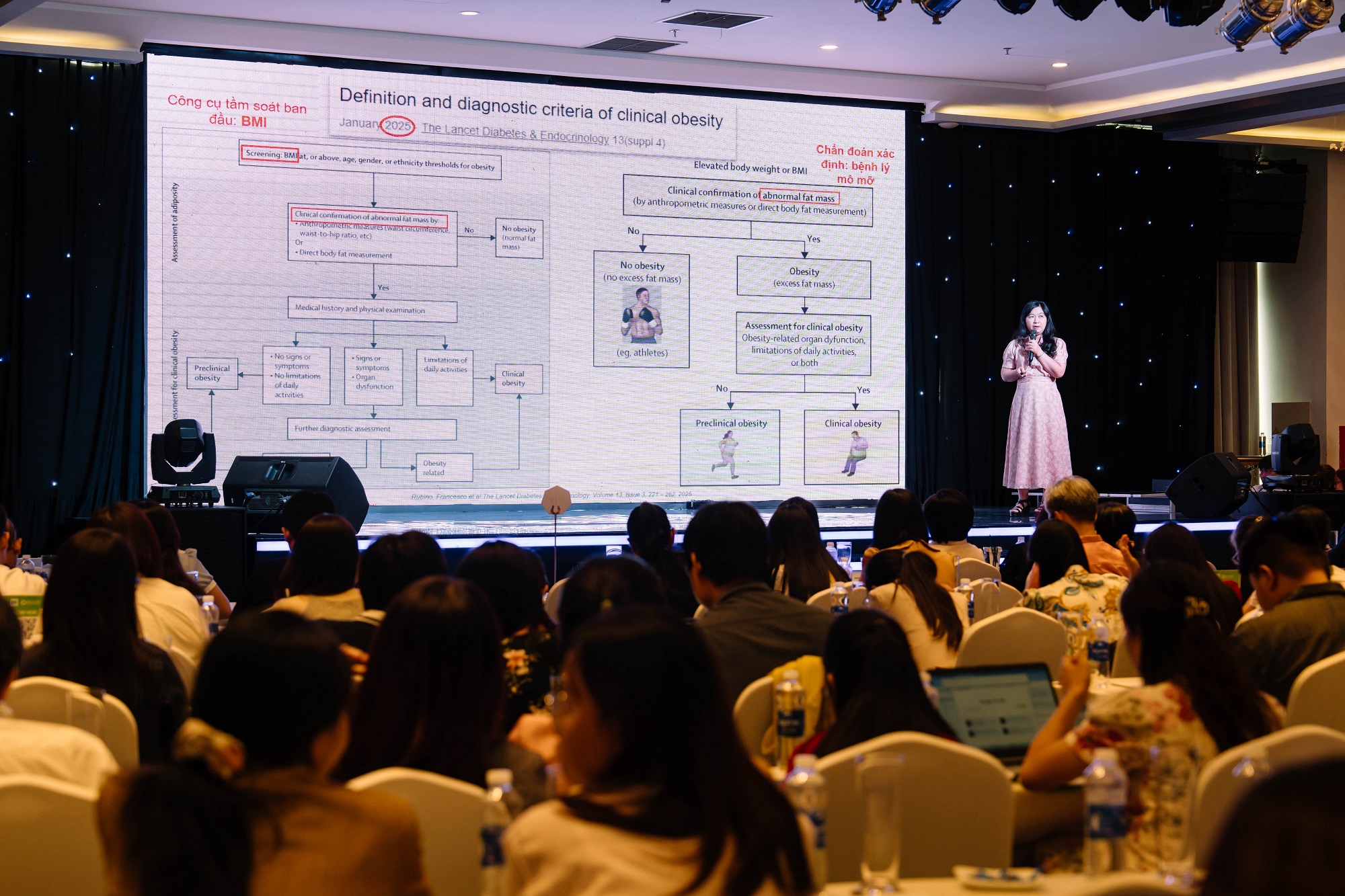On 20/9, experts at the "Scientific Conference on Nutritional Disorders in Cancer Patients," hosted by the Ho Chi Minh City Oncology Hospital with the support of Orgalife, discussed and proposed solutions for malnutrition and obesity in cancer patients.
The conference, held at the Adora Dynasty Convention Center in Ho Chi Minh City, was chaired by Doctor Diep Bao Tuan, Director of Ho Chi Minh City Oncology Hospital, along with several leading nutrition experts. Reports presented at the conference indicated that nutritional disorders are currently one of the biggest challenges in cancer patient care.
 |
Doctor Diep Bao Tuan, Director of Ho Chi Minh City Oncology Hospital, delivers the opening speech at the conference. Photo: Orgalife |
Doctor Diep Bao Tuan, Director of Ho Chi Minh City Oncology Hospital, delivers the opening speech at the conference. Photo: Orgalife
According to research by Doctor Tran Thi Anh Tuong, Head of the Department of Nutrition and Dietetics at Ho Chi Minh City Oncology Hospital, the rate of sarcopenia ranges from 8% to nearly 85%, depending on the type and stage of cancer. Simultaneously, obesity is recognized as a risk factor for at least 13 types of cancer, according to the International Agency for Research on Cancer (IARC). Both sarcopenia and obesity negatively impact prognosis, quality of life, and drug tolerance. Therefore, early detection and regular monitoring are crucial for timely intervention.
Doctor Diep Bao Tuan stated, "One reason why many patients miss the opportunity for optimal treatment is the neglected state of their nutrition. Nutrition should be considered part of the cancer treatment plan, not just supportive care."
 |
Discussion session with the chairman and speakers of the conference. Photo: Orgalife |
Discussion session with the chairman and speakers of the conference. Photo: Orgalife
Recognizing malnutrition and obesity in cancer
The two contrasting conditions of malnutrition and obesity are both prevalent in cancer patients, making treatment more complex. According to Doctor Huynh Pham Thanh Tra from Ho Chi Minh City Oncology Hospital, sarcopenia is characterized by unintentional weight loss, skeletal muscle loss, and difficulty recovering with conventional nutrition. It is a complex metabolic syndrome caused not only by energy deficiency but also by systemic inflammation and other biological factors.
Doctor Tran Thi Kim Chi, Head of the Department of Nutrition and Dietetics at Gia Dinh People's Hospital, also noted that obesity increases the risk of cancer and creates difficulties in treatment. However, some studies have reported an "obesity paradox," where overweight individuals sometimes have a better prognosis in certain types of cancer. This poses a significant challenge for doctors in assessment and intervention.
 |
Doctor Tran Thi Kim Chi, Head of the Department of Nutrition and Dietetics at Gia Dinh People's Hospital, presents her report. Photo: Orgalife |
Doctor Tran Thi Kim Chi, Head of the Department of Nutrition and Dietetics at Gia Dinh People's Hospital, presents her report. Photo: Orgalife
Experts agreed that BMI alone is not sufficient to reflect nutritional status. Instead, more specialized tools like body composition analysis, CT scans, or muscle ultrasound should be used to measure muscle mass. More importantly, the assessment must be conducted by a multidisciplinary team including oncologists, nutritionists, endocrinologists, nurses, and psychologists.
Appropriate solutions for intervention and treatment
In light of this situation, the conference proposed multimodal and personalized strategies for nutritional care in cancer patients. General recommendations include: energy (25-30 kcal/kg/day); protein (1.2-1.5 g/kg/day); and Omega-3 (EPA/DHA) supplementation to combat inflammation and prevent muscle loss.
According to Doctor Tran Thi Anh Tuong, Omega-3 supplementation, especially EPA and DHA, has proven effective in maintaining muscle mass and improving the quality of life for cancer patients. Physical activity, particularly resistance training, is also recommended. However, for many patients, daily food intake and resistance training are difficult to maintain at sufficient levels. This is why medical nutrition solutions become essential.
At the conference, Orgalife introduced Leisure Omega X2, a high-energy, protein-rich, and Omega-3-rich meal replacement specifically designed for cancer patients. The product helps prevent muscle loss, reduce inflammation, and improve appetite, offering a solution for patients with sarcopenia, weight loss, or loss of appetite. In addition to Leisure Omega X2, Fomeal Peptides also helps support rapid recovery for patients before and after surgery.
Doctor Diep Bao Tuan acknowledged that the partnership with nutrition companies like Orgalife not only provides products but also contributes to building a comprehensive care platform for cancer patients in Vietnam.
Nguyen Nhat Phi, a representative from Orgalife, stated that Orgalife considers cancer patient care a long-term goal. "We are committed to providing scientific, safe, and personalized nutritional solutions for each patient's condition, contributing to improving treatment effectiveness and quality of life," Phi shared.
The Dan












